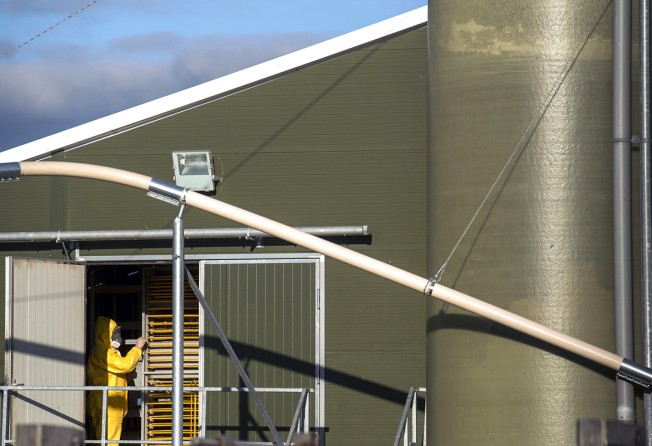
Dutch authorities identify bird flu strain as highly contagious H5N8
Cull of 150,000 chickens under way at Netherlands egg-producing farm after highly contagious H5N8 strain detected; H5 case at UK duck farm

Dutch authorities said they had identified the bird flu involved in a major outbreak at a poultry farm in the central Netherlands as H5N8, the same highly contagious strain that wrought havoc in Asia this year.

The Netherlands cull came as a duck breeding farm in northern England was closed off yesterday after an outbreak of bird flu, although officials said the risk to public health was "very low".
An estimated 6,000 ducks on the farm will be culled and a 10km restriction zone has been put around the site near Driffield in Yorkshire.
Renowned virologist and bird flu expert Ron Fouchier said British authorities had told their European counterparts that the virus was the same H5N8 strain as found in Germany earlier this month and now in the Netherlands.
An EU source said that it was "most likely the same strain in all three places" - the Netherlands, Britain and Germany.
The source said "more outbreaks would not be surprising" in countries such as France, Spain and Italy as the "disease might have come from swans migrating from north to south".
H5N8 has never been detected in humans, but an outbreak in South Korea in January saw millions of farm birds slaughtered. Cases have also been reported in China and Japan. The German report was the first in Europe.
The European Commission said it expected yesterday to adopt urgent interim protective measures to contain the outbreak, including a ban on selling poultry products from the affected areas.
The Netherlands on Sunday imposed a 72-hour ban on transportation of poultry products, including birds, eggs, dung and used straw to and from poultry farms across the country.
Between them, Dutch poultry farms sell more than six billion eggs abroad every year, though it is not known how many of the 697 farms are exporters. Germany is the largest destination, taking 75 per cent of all exports, figures published by Rabobank showed. The Netherlands is also a leading poultry exporter.
Agricultural inspectors started destroying the 150,000 chickens at the farm in the village of Hekendorp which sold eggs rather than poultry.
Produce from the farm was sold primarily in the Netherlands, the farm's owner, Piet Wiltenburg, said. "There is absolutely nothing wrong with that produce," he said.
Some 10,000 chickens were destroyed in March after bird flu was found at a farm in the eastern Dutch province of Gelderland, but the country has not had cases of any of the highly contagious H5 or H7 strains of bird flu in the past 10 years, according to data from the World Organisation for Animal Health.
Earlier outbreaks in Europe and Asia have infected humans, prompting fears of a bird flu epidemic.
The transport ban will remain in force for 30 days for the 16 poultry farms within a 10km radius of the site of the outbreak, and all of them will be subject to enhanced security measures for visitors and regularly checked for signs of bird flu.
The commission's decision to ban the selling of poultry products from the affected areas identified by the Dutch authorities to other countries is a standard procedure in the case of bird flu outbreaks, it said.
- An 19-year-old Egyptian woman died yesterday of H5N1 bird flu after coming into contact with infected birds, the second such death in the country this year, a health ministry spokesman said.
Additional reporting by Agence France-Presse